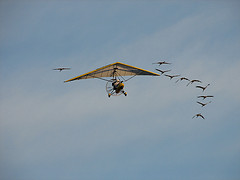
Nine endangered whooping cranes, migrating from Wisconsin to Florida, recently spent a month grounded in Alabama, after the FAA decided that their “pilot guides” were operating in violation of a regulation which prohibits them from receiving pay for their services. The pilots, who work for Operation Migration are outfitted to look like the birds, as are their small, ultralight aircraft. FAA regulations do not allow such aircraft to be used for “commercial purposes”, and paying the pilots makes this a commercial purpose in the FAA’s eyes.
Joe Duff, co-founder and CEO of Operation Migration, the group leading the crane effort, says its pilots are full-time employees who get compensated for working with the birds seven days a week — working on many different job responsibilities — and that the flying is done on a volunteer basis.
The FAA first accepted the explanation, but after further review decided that the organization was not meeting the requirements. Operation Migration decided to voluntarily ground the rare birds at that time, in the middle of their journey, until they were able to legally continue the flight.
Operation Migration is an organization that assists whooping cranes hatched in captivity, from their first steps through their first migratory trip south. To help the whooping cranes become true wild animals when they start to live on their own, the organization practices “isolation rearing,” in which all people who come into contact with the birds must wear a costume that looks like a whooping crane.
…
According to an FAA statement, “Because the operation is in ‘mid-migration,’ the FAA is granting a one-time exemption so the migration can be completed. The FAA will work with Operation Migration to develop a more comprehensive, long-term solution.”
Duff said the FAA has two criteria for issuing a waiver of this regulation: first, that it does not impede safety; and second, that it is a benefit to the American people. Duff believes Operation Migration’s flights meet both criteria, noting their three pilots practice all safety measures and the organization is assisting with the eco-tourism business and reintroducing an endangered species, which he believes does benefit the American people.
The FAA and Operation Migration will work to resolve the situation in the near future, but for now, this year’s new flock continues the journey south for the winter.
Related articles
- FAA says pilots can guide whooping cranes (seattletimes.nwsource.com)
- Green Blog: Crane Migration Can Resume, F.A.A. Says (green.blogs.nytimes.com)
- FAA Rules May Interrupt Endangered Crane Migration (npr.org)
- F.A.A. Rules Whooping Crane Migration Can Begin (naturalhistorywanderings.com)
- Bird plane runs afoul of federal regulators (sfgate.com)
